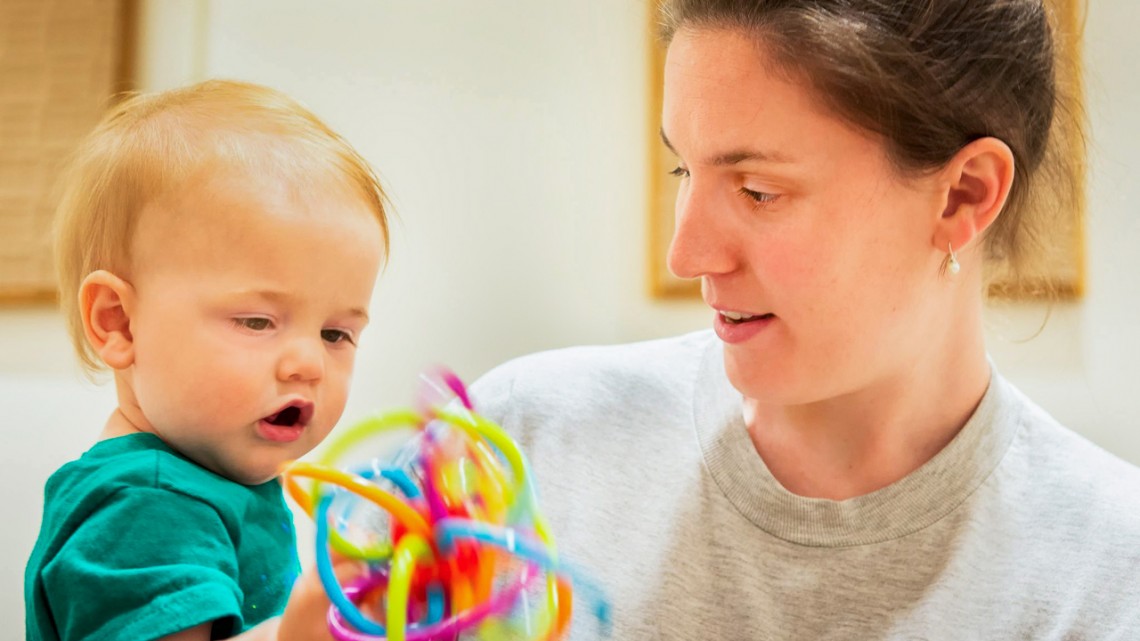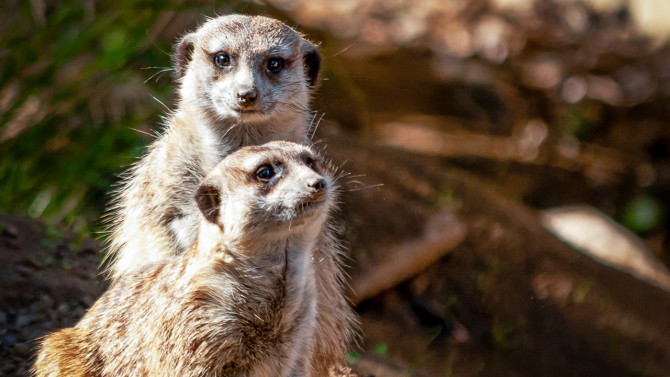
A mother and baby participating in a study in Cornell’s B.A.B.Y Laboratory.
Prolonged immaturity an evolutionary plus for human babies
By Kate Blackwood
Newborn horses can stand within an hour of birth. Baby wood ducks leap from a nest to splash down in a pond a day after hatching. Yet human babies, as well as the young of many other species of mammals and birds, require months or years of care before they reach full mobility and sensory function, let alone maturity.
This prolonged period of immaturity and helplessness – or altriciality – in human babies and other species, long thought to be a drain on resources, is actually an evolutionary advantage, say Cornell researchers.
In “The Origins of Social Knowledge in Altricial Species,” published in December in the Annual Review of Developmental Psychology, Michael Goldstein, associate professor of psychology in the College of Arts and Sciences – with doctoral students Katerina Faust, Samantha Carouso-Peck and Mary R. Elson – argues that extended altriciality creates opportunities for sophisticated social learning within the parent-offspring system.
“Protracted immaturity and dependence on paternal care is not an unfortunate byproduct of our evolution but instead a highly adaptive trait of our species, which has enabled human infants to efficiently organize attention to social agents and learn efficiently from social output,” they wrote. “The evolutionary goal of altricial species is not to become highly competent as quickly as possible but rather to excel at learning over time.”
The Cornell researchers compared 20 species, drawing on comparative findings to illustrate that altriciality functions as an adaptation for social learning from caregivers.
Goldstein’s lab has in-house research programs on both songbirds and human infants. Comparative research, he said, yields valuable findings about how parents work with their offspring to enable learning: “We investigate the cross-species parallels in how infants solve similar problems, like learning your communication system.”
“If you only look at babies in isolation, it seems impossible for them to learn all these advanced skills, so there must be knowledge built in,” said Faust, who studies zebra finches, which share altricial traits with humans. “But as soon as you view them in a social context with their parents, you can see there’s a lot of structure and scaffolding of information that makes it easy for them to learn.”
Altricial young have limited senses, Faust said, allowing them to learn information one bit at a time from parents and the environment. For example, she said, young rats explore first by smell; then, as their eyes become unsealed, they add sight to olfactory knowledge.
Similarly, human babies have limited sight at birth, Goldstein said, allowing them to focus closely at first on one large, high-contrast object that will be an important source of information for years to come: their parent’s face.
“While such helplessness may seem like a detriment, the beauty of perceptual immaturity in altricial species is that it makes learning easier by reducing the complexity of the world,” the researchers wrote.
Parents are key to altricial learning, Goldstein said, forming a two-way system of feedback. Far from being passive recipients, he said, infants of many species can change the behavior of their parents in ways that actively shape their own developments.
For example, African meerkat pups make lower-pitched begging calls as they age, Faust said, signaling to parents that they are ready for increasingly complex forms of food.
Human infants need to acquire complex social skills, including language, empathy, morality and theory of mind, the researchers said. Successful development of these skills depends on information from adults: “Rather than requiring hard-wired, innate knowledge of social abilities, evolution has outsourced the necessary information to parents,” they wrote.
Ecologically, prolonged altricial development may give species the ability to adapt to changing or new environments, Faust said.
Humans are especially good at filling new ecological niches “because we have the capacity to learn how to survive in new environments,” Goldstein said. “Once your parents learn an adaptive skill, you’ll learn from them. You don’t have to reinvent the wheel.”
Kate Blackwood is a writer for the College of Arts and Sciences.
Media Contact
Get Cornell news delivered right to your inbox.
Subscribe

